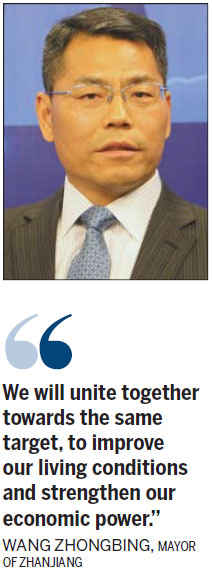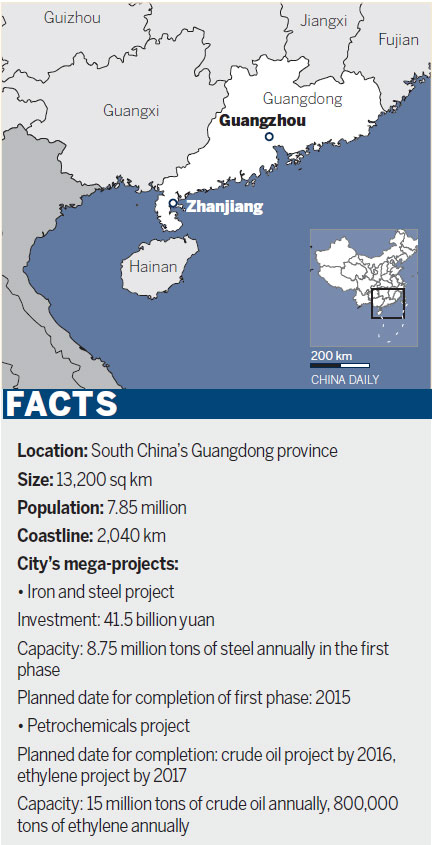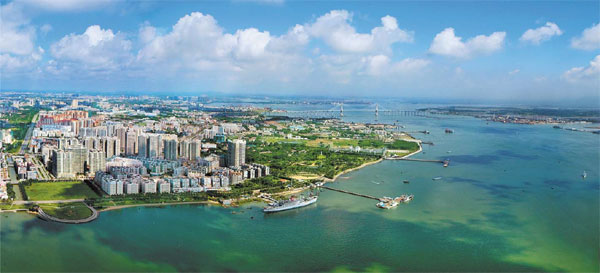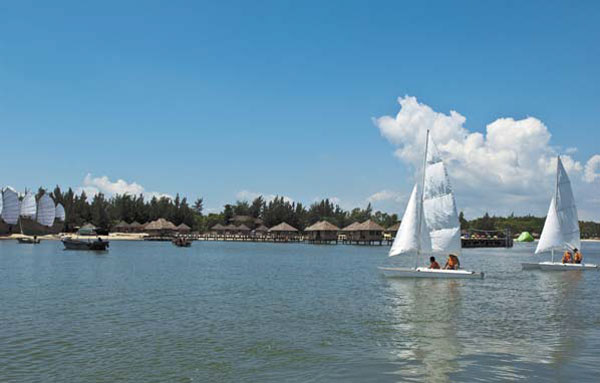Zhanjiang looks forward to a bright future
City puts people at the heart of social and economic development plans, Tracie Barrett and Hu Zhe report.
Zhanjiang Mayor Wang Zhongbing has confidence in a bright future for the coastal city in Guangdong province, as the local government works with residents to improve living conditions and strengthen the city's economic power.
While in Beijing to attend the annual two sessions, Wang took time out to explain Zhanjiang's current and future development plans as the national economy enters the "new normal", the term used by President Xi Jinping in reference to economic conditions in China that differ from the former high-growth period.
|
The coastal city of Zhanjiang is on track to healthy development based on an innovation-driven and eco-friendly growth model. Photos provided to China Daily |
|
Techeng Island is a resort in the city and an example of the local government's efforts in environmental protection. |
"During past times, the Chinese economy was stimulated by tremendous investment," Wang said, "but that time has passed. Now we have to find a new engine for the development of our national economy. That new engine is mass entrepreneurship and innovation."
The mayor said that as China goes into a new stage of social and economic development, Zhanjiang would build its own innovation-driven style of development. "That is the philosophy and focus of the local government," he said.
As part of a "Southern Maritime Valley" the city is establishing, it will focus on creating a cluster of six major industries - steel-making, petrochemicals refining, paper-making, home appliance manufacturing, biopharmaceuticals and aquatic products.
"This cluster of industries will push forward Zhanjiang's development," Wang said.
Centering on the bay area of Zhanjiang, the Southern Maritime Valley" will depend on scientific and technological innovation to develop maritime industries. It aims to upgrade maritime science and technology in Guangdong province and help China become a stronger maritime power.
In 2014, the valley became a key platform for Guangdong's innovation-driven development.
Zhanjiang's government is drafting innovation-driven policies to build the valley. These policies will help attract creative talent to work in the city and facilitate innovative enterprises' development there by giving taxation incentives.
Local governments in the city also plan to build an intelligent industrial park in the valley and Wang said he hopes the park will appeal to scientific and technological enterprises as well as R&D organizations related to the steel, petrochemicals and paper-making industries.
The city will expand cooperation among the government, businesses and academic institutions as a high-value engine for what Wang described as the high-tech valley.
"In the past, college research results only stayed on paper, not in practice," Wang said, speaking fluent English. "Now we will deepen the relationship among the government, industry and colleges to put the research results into the companies, to make money and make mutual benefits."

As part of China's "One Belt and One Road" initiative, which refers to the New Silk Road Economic Belt and the 21st-Century Maritime Silk Road, Zhanjiang was designated a pivot city on the maritime route. Wang said this designation creates huge potential for the development of the city's economy.
'Many opportunities'
"One Belt, One Road will give us many opportunities," he said.
Zhanjiang has a population of nearly 8 million people as well as rich forest, land and maritime resources, particularly its deepwater harbor, which the mayor described as "the shortest route to the world from China".
"The harbor is a very important infrastructure of the city," he said.
The throughput capacity of Zhanjiang Port exceeded 200 million metric tons in 2014 and Wang said that capacity would increase in the future. "Opening wider to the outside world will create more favorable conditions to adapt to the new normal of the economy.
"In the next three or four years, the throughput of the harbor will reach 300 million tons and go into the top 10 national harbors," he said.
One reason for the port's achievement is the signal given to other companies by the current construction of major facilities for Baosteel, China's largest steel company, and Sinopec, Asia's largest petrochemicals refiner.
Wang said the two are "giant projects", with billions of yuan of investment. The local government is working with the companies and the local people, he said, "to make the best balance between economic development and environmental protection".
Construction on the main part of Baosteel's project started in May 2013 and there are now some 18,000 people working on site.
The project is expected to drive the development of other industries including equipment, cars, home appliances and ships. It will also create many jobs for local residents and help teach technical management skills for modern manufacturing.
It is regarded as an iconic project that will help shift Zhanjiang from an agricultural city to an industrial one and thus promote civilization of the city.
In the second major project, Sinopec and Kuwait National Petroleum Co are jointly building petrochemicals facilities that will cover an area of 12.26 square kilometers in the Zhanjiang Economic and Technological Development Zone.
Zhanjiang government's website said the facilities will have the capacity to annually refine 15 million tons of oil and produce 800,000 tons of ethylene.
Both projects will increase the economic and competitive power of the city, Wang said, "but environmental protection is the most important for our local people".
Baosteel is spending 16 percent of the project's total investment on energy saving and environmental protection and has adopted 116 energy-saving and environmental protection technologies during construction.
Sinopec's project will adopt advanced pollution control technologies that are up to international environmental protection standards.
'Footprint City'
In keeping with that environmental awareness, Zhanjiang has also formulated the concept of a "Footprint City", with a focus on the rights and enjoyment of residents and visitors.
"The core of a city is the people," Wang said.
The concept focuses on respecting nature and the ecosystem, while creating comfortable living and leisure conditions. It encourages residents to walk, ride bicycles and take buses instead of driving cars when possible to reduce carbon emissions.
The concept is popular with residents in Zhanjiang, local media reported.
In 2014, Zhanjiang's government chose Shenchuan Avenue, the main road in downtown Zhanjiang, as a pilot street to separate lanes for buses, bicycles and pedestrians. It also opened 272 bike rental stations that offer 5,000 bikes.
The number of environmentally friendly buses will increase by 346 this year and more bus routes will come into service.
One part of the Footprint City" will also involve the creation of "life-enhancing streets", where Wang said people "can sit in chairs, can stop and talk, not only walking, not only running but also enjoying the life of the city and having time to talk with each other".
"We will build long green walking corridors, greenways, for pedestrians, so the city has suitable and comfortable living conditions for residents, not only for cars," he added.
The mayor's energy and enthusiasm were obvious as he spoke of his expectations for his city's future.
"Zhanjiang is a large and beautiful city, for traveling, for living and working," he said.
"Three decades have passed since Zhanjiang opened to the world in 1984. Now Zhanjiang will turn a new page, a new page for living conditions improving, for industries, for entrepreneurship, also a new page for the image of our city. Also a new page for the success of local people, every person, including men, women, the young and old.
"We don't only want everyone to share in the success of our city, we want everyone to contribute to our city's success. A bright future is ours to write. Let's begin this new page, let's start right now.
"We will unite together toward the same target, to improve our living conditions and strengthen our economic power. Our city is brighter and brighter. We have confidence in our future."
Song Mengxing contributed to this story

(China Daily 03/28/2015 page17)
















